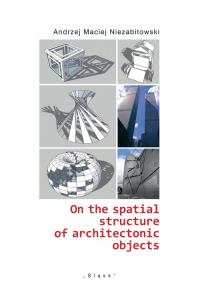
On the spatial structure of architectonic objects
-
Autor: Niezabitowski Andrzej Maciej
- ISBN: 9788371644801
- EAN: 9788371644801
- Oprawa: oprawa: broszurowa
- Wydawca: Śląsk
- Format: 160x239 mm
- Język: angielski
- Liczba stron: 556
- Rok wydania: 2019
- Wysyłamy w ciągu: 48h
-
Brak ocen
-
77,39złCena detaliczna: 90,00 złNajniższa cena z ostatnich 30 dni: 50,75 zł
x
This book is the fruit of more than forty years of my research connected with the description, analysis, comparison and systematisation of architectonic forms in
terms of space. This research began in the 70s and first culminated in the thesis which established me as an assistant professor. Its title was On the spatial structure
of works of architecture: the methodological principles of description, analysis and systematisation of spatial arrangements. It was published in 1979 in
Zeszyty naukowe Politechniki Śląskiej w Gliwicach (The Scientific Bulletin of the Technical University in Gliwice). In the following years, I continued my research
into the subject with various levels of intensity which resulted in several publications (Niezabitowski, 2004, 2005, 2009). These were mainly articles and conference
lectures. The main plot the structure of space in architecture and its hypothetical universality never ceased to appear throughout the research and, along the way, was enriched by new methodological approaches. (...)
terms of space. This research began in the 70s and first culminated in the thesis which established me as an assistant professor. Its title was On the spatial structure
of works of architecture: the methodological principles of description, analysis and systematisation of spatial arrangements. It was published in 1979 in
Zeszyty naukowe Politechniki Śląskiej w Gliwicach (The Scientific Bulletin of the Technical University in Gliwice). In the following years, I continued my research
into the subject with various levels of intensity which resulted in several publications (Niezabitowski, 2004, 2005, 2009). These were mainly articles and conference
lectures. The main plot the structure of space in architecture and its hypothetical universality never ceased to appear throughout the research and, along the way, was enriched by new methodological approaches. (...)

